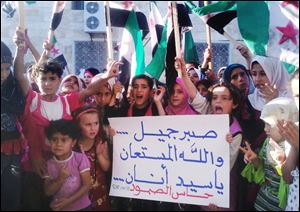
Over 200 killed in Syria as rebel area is targeted
7/13/2012
Syrian children chant slogans and hold an Arabic poster reading "Patience is good, and God is the one who helps ... " in Syria's Idlib province.
BEIRUT -- More than 200 people, mostly civilians, were massacred in a village in the rebellious Hama region of Syria when the area was bombarded by helicopter gunships and tanks and then stormed by militiamen, opposition activists said.
If confirmed, it would be the worst single incident of violence in 16 months of conflict in which rebels are fighting to topple Syrian President Bashar Assad.
Diplomacy to halt the bloodshed has been stymied by jostling among world powers.
The Revolution Leadership Council of Hama told Reuters the Sunni Muslim village of Tremseh was subjected on Thursday to a barrage of heavy weapons fire before pro-government Alawite militiamen swept in and killed victims one by one.
"More than 220 people fell today in Tremseh. They died from bombardment by tanks and helicopters, artillery shelling, and summary executions," the regional opposition group said.
Syrian state television said three security personnel had been killed in fighting in Tremseh and it accused "armed terrorist groups" of committing a massacre there.
Fadi Sameh, an opposition activist from Tremseh, said he had left the town before the reported attacks but was in touch with residents.
"It appears that Alawite militiamen from surrounding villages descended on Tremseh after its rebel defenders pulled out, and started killing the people. Whole houses have been destroyed and burned from the shelling," he said.
"Every family in the town seems to have members killed. We have names of men, women, and children from countless families," he said, adding that many of the bodies were taken to a local mosque.
Ahmed, another local activist, also talked to Reuters.
"So far, we have 20 victims recorded with names and 60 bodies at a mosque. There are more bodies in the fields, bodies in the rivers, and in houses. ... People were trying to flee from the time the shelling started and whole families were killed trying to escape."
The reports could not be independently confirmed. Syrian authorities severely limit access for journalists.
Earlier Thursday, the first ambassador to abandon Assad called on the army to "turn your guns on the criminals" of the government as troops backed by tanks swarmed into a suburb of Damascus to flush out rebels.
Nawaf Fares, a Sunni Muslim who has close ties to the security services, was Syria's ambassador to neighboring Iraq. Defecting just days after the desertion of Manaf Tlas, a Sunni brigadier general in the elite Republican Guard who grew up with the president, Mr. Fares' defection gave the anti-Assad uprising one of its biggest political lifts.
Mr. Fares announced that he was joining the revolution, asserting Thursday that only force will drive Assad from power.
"There is no road map ever with Bashar Assad, because any plan, any statement that is agreed on internationally he delays on and ignores," Mr. Fares told the Al-Jazeera satellite channel. "There is no way that he can be pushed from power without force, and the Syrian people realize this."
Syria's Foreign Ministry denounced Mr. Fares, saying he should face "legal and disciplinary accountability."
In Washington, State Department spokesman Patrick Ventrell hailed what he called the "first major diplomatic defection."
"We think this a wider sign that the regime is feeling the pressure. The pressure is up and the regime is really starting to fall apart."
Activists say more than 17,000 people have been killed since the uprising against Mr. Assad began in March, 2011, and he is coming under growing international pressure to stop the violence.
At the United Nations on Wednesday, Britain circulated a draft backed by the United States, France, and Germany that would make compliance with a transition plan drafted by international envoy Kofi Annan enforceable under Chapter 7 of the U.N. Charter.
This would allow the council to authorize actions ranging from diplomatic and economic sanctions to military intervention.
Mr. Assad's strongest strategic ally, Russia, stuck by him on Thursday with a clear warning to his Western and Arab enemies that it would not even consider calls for the new U.N. resolution.
Russia's Deputy U.N. Ambassador Alexander Pankin warned that his country would use its veto power on any such measure.
"We are definitely against Chapter 7," he said. "Anything can be negotiated, but we do not negotiate this, this is a red line."
In other developments, Syrian forces shelled the suburbs of the capital, Damascus, to flush out rebels from areas where they have established a foothold.
Troops pounded Mezzeh and Kafr Souseh in eastern Damascus with mortars, sending residents streaming out, activists said. They also targeted the Liwan, Qadam, and Daraya neighborhoods from a military airport.
Human Rights Watch said it had found evidence the Syrian government had fired cluster bombs near the central city of Hama. These often do not explode on impact. But they remain explosive, increasing the threat of later injury to civilians.